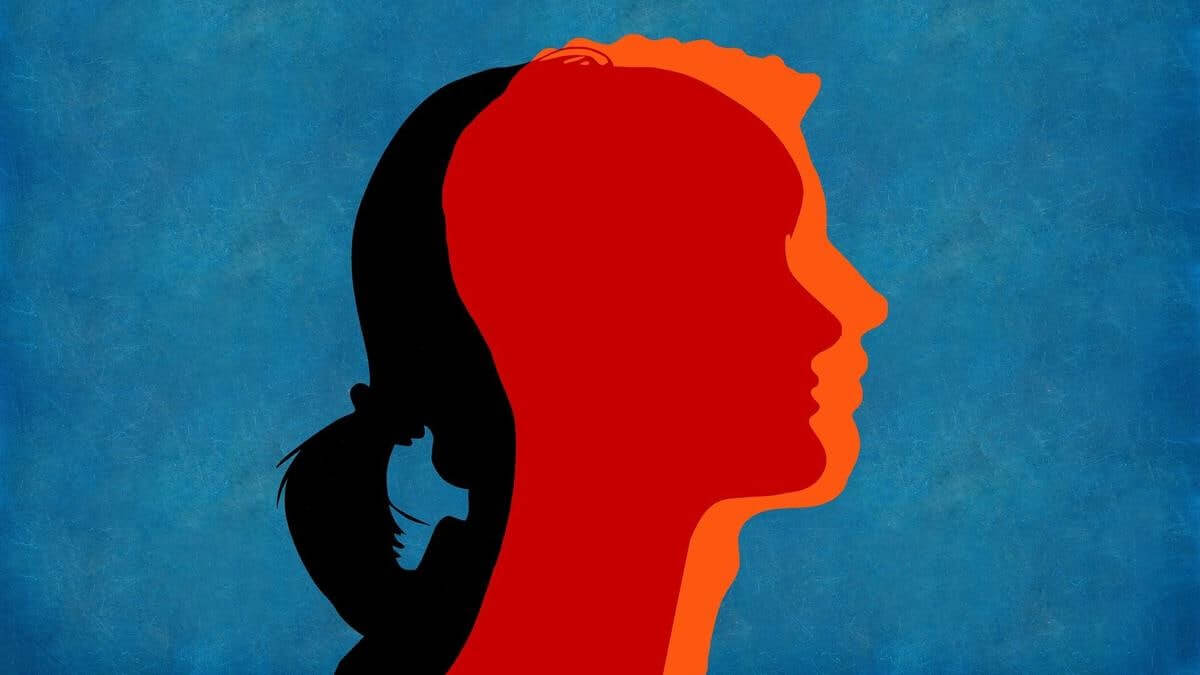Russists’ hunt for LGBT people and military relatives and kidnapping of children: Life in Kherson in wait for Ukrainian Army
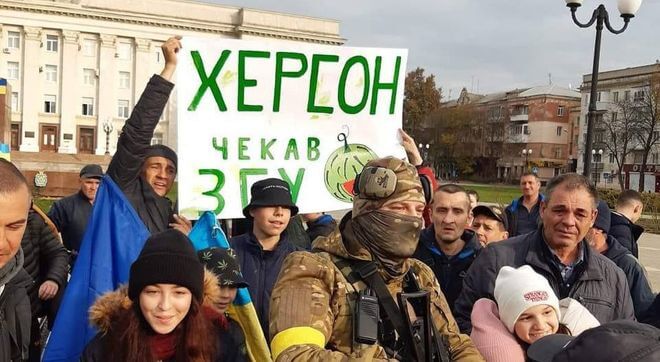
Translated by Valeria Khotsina
Ukrainian military entered Kherson on November 11, according to the official report of intelligence agencies. After that the city was cleared of the invaders before it was able to return to a more stable life. How had the locals lived in the nine months prior to that?
As of 1 January 2022, over 279 thousand people lived in Kherson. After Russia’s full-scale invasion of Ukraine on February 24, about 80% of residents left the city. What did the life of those whostayed look like, and what human rights have been violated by the Russists during the months of occupation?
The Page spoke to Maryna Usmanova, director of the feminist and LGBT-inclusive organisation Insha (Other). The organisation had to relocate to Berlin and for the last eight months, it has been helping women and members of the LGBT community to leave Kherson, as well as providing humanitarian and psychological assistance to internally displaced persons.
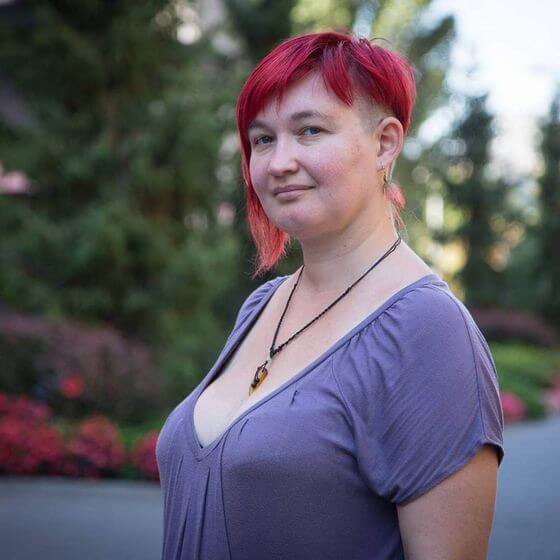
Maryna helped LGBT people to flee Kherson
Life in Kherson under occupation: food, medicine and communication
A few days before the de-occupation, power was cut in Kherson, pharmacies did not work, and only some shops and markets were open and anyway did not sell perishable foodstuffs. During the day it was possible to buy some cereals, but locals mostly stocked up on food and rarely left their homes.
The invaders imposed an almost twenty-four-hour curfew, during which it was possible to leave the house only for some shopping. There were no medicines left in the pharmacies – the Russists took everything away, and no new medicines (or food) were brought.
Kherson residents welcome the Armed Forces of Ukraine in the city
It was also impossible to call out the firemen; just a couple of ambulances were servicing the whole city.
The main thing that characterised life in Kherson before the arrival of the Ukrainian Army is the absolute insecurity of every resident. If there was a fire, there was no one to extinguish it. Bandits ran freely in the city, and the police did not offer any protection.
The people who remained in the city were really waiting for liberation – the vatniks, according to locals, left, and those who stayed in the city did not want to go to Russia. Some of those who remained in Kherson are bedridden and received support from local volunteers, if they could go out and get food for the sick and elderly.
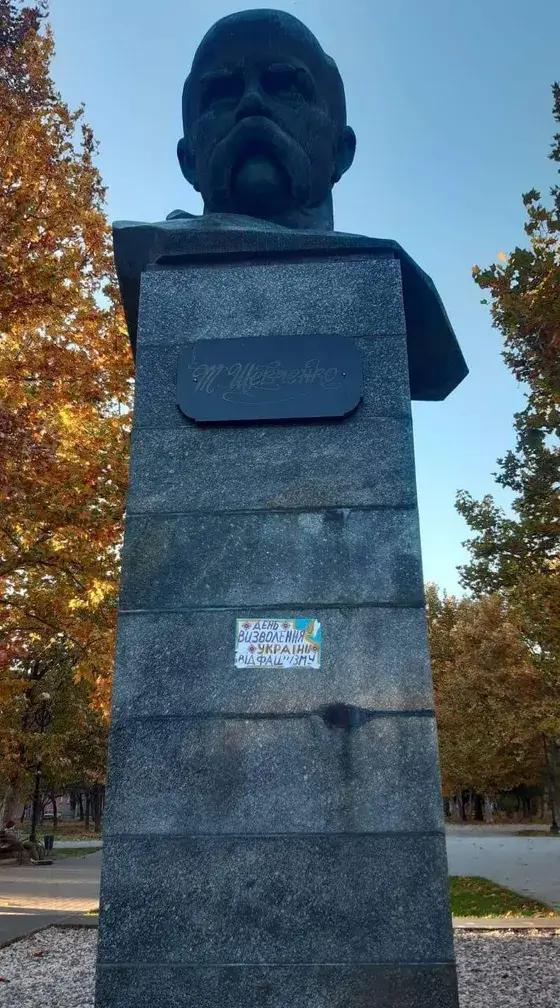
Residents of occupied Kherson have been living without communication, medicines and fresh food
for the last few weeks. Photo: Yevhenia Virlych
The Russians intimidated the locals by saying that the city would be bombed, flooded, and encouraged them to go to russia, where they promised to provide the evacuated population with everything necessary. Some people who had been waiting for the Ukrainian Armed Forces for a long time got really scared and left for russia – many of them hoping to get to Georgia or Estonia through Crimea and russia.
There was no Ukrainian mobile service in Kherson in recent weeks either. The only thing that worked was Phoenix – a phone card that the invaders handed out under the guise of a russian sim card. However, it is not connected to a russian network, but parasites on other networks. It is impossible to call either Ukraine or russia with this sim card, only another Phoenix subscriber. Sometimes the Internet connection would appear in Kherson – when the invaders wanted it.
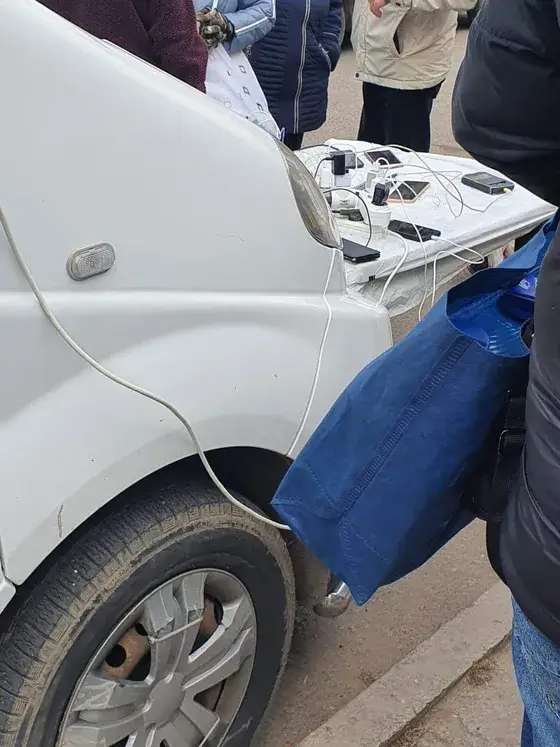
Kherson residents charge their phones from a car due to the lack of power. Photo: Yevhenia Virlych
Therefore, the locals contacted the rest of Ukraine in the following way: they called a Phoenix subscriber, say, in Mariupol, and from there the locals would contact the Ukrainian-controlled territories, for example, via WhatsApp.
As for personal safety in the street, the situation could be different in different parts of the city, depending on how much the russians maintained order and how angry they were.
Was it possible to leave the occupied Kherson?
It was next to impossible to leave the occupied Kherson in recent weeks. There was a very low probability that a person would pass a checkpoint, and even then only through Crimea or the occupied territories of Luhansk and Donetsk Regions.
This route was dangerous because you did not know where you would end up next. For example, some people hoped to get to the Russian-Georgian border, but they were denied permission to leave russia. Some were taken to Skadovsk. This evacuation route (through Crimea or Luhansk and Donetsk Regions) was possible only by the invaders’ buses, and it was unknown where they would actually take you.
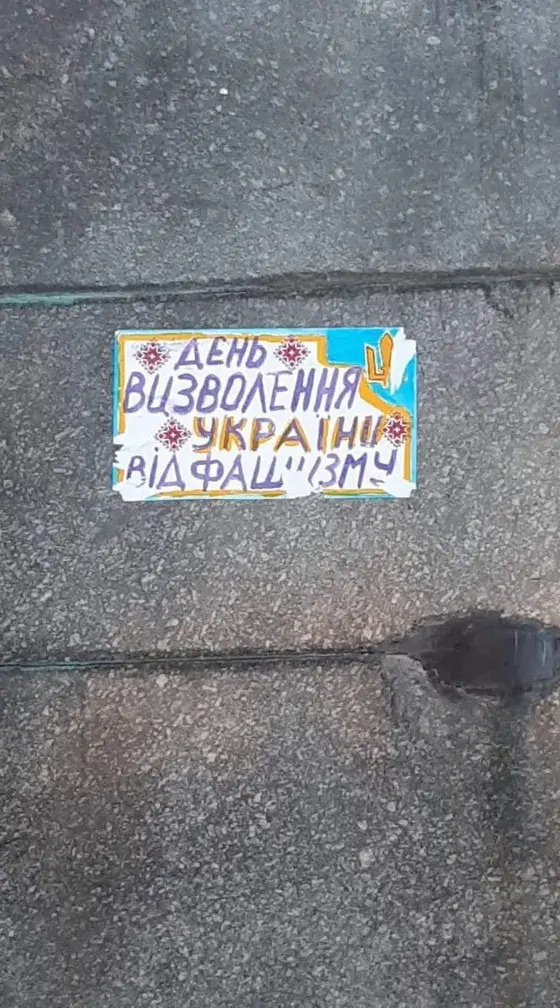
Residents of Kherson were waiting for the Armed Forces of Ukraine and helping the bedridden people. Photo: Yevhenia Virlych
It was no longer possible to leave in the direction of Ukraine or enter from that side (aside from the offensive of the Armed Forces of Ukraine), as well as to import anything.
Therefore, the risks for those who stayed were no longer in leaving, but in the fact that the russians could subject the territory to blanket bombing, flood it by blowing up the Kakhovka hydroelectric power plant, or detonate a dirty bomb, etc.
How Ukrainians helped Kherson residents
For some time Ukrainian volunteers were delivering necessary medicines and humanitarian aid to Kherson. But in the last weeks of occupation it was no longer possible, so volunteers in Ukraine or abroad collected money, transferred it to local volunteers, and they withdrew money with the help of profiteers with 5-20% commission.
The local volunteers would then buy something at the market – food and hygiene products, which were increasingly scarce – and help the bedridden people. Also, such communication – through Ukraine and, for example, Berlin – helped volunteers in Kherson to contact each other and share information about currency exchange opportunities or open shops.
What basic human rights were violated by the invaders in Kherson?
A quick run through the articles of the Constitution of Ukraine related to human rights shows that almost all of them were probably violated by russists in occupied Kherson:
- right to free personal development (Article 23, children in schools had to listen to all the nonsense of russian propaganda from their new teachers);
- gender, racial, ethnic, and other equality (Article 24, female relatives of the Armed Forces of Ukraine were hunted and abused, and hatred towards LGBT people and Crimean Tatars flourished);
- a citizen of Ukraine cannot be expelled from Ukraine or extradited to another state (Article 25, Ukrainian children were forcibly taken to Crimea or the territory of russia);
- inalienable right to life (Article 27, there are known facts of people being shot by trying to leave the occupied territory);
- right to respect for dignity (Article 28, locals were forcibly stripped in the street as punishment);
- right to liberty and security of person (Article 29, people disappeared, were locked in basements or captured, the fate of many is unknown);
- right to inviolability of the home (Article 30, the apartment could be broken into, robbed, evicted, soldiers forcefully moved in, etc);
- secrecy of correspondence, telephone conversations, telegraph and other correspondence (Article 31, phones were checked on the streets, deleted programs were restored in search for something pro-Ukrainian or suspicious for russians);
- interference in personal and family life (Article 32, LGBT people were purposefully hunted, tortured in basements, and bullied);
- freedom of movement, free choice of place of residence (Article 33, at least children were forcibly taken away, threats were made to take children away from their parents, and some of the locals left for Crimea or russia, fearing that their children would be taken away, adults were not allowed to leave the occupied territories);
- freedom of thought and speech, the right to free expression of opinions and beliefs (Article 34, people were forced to vote at gunpoint at the fake referendum, persecuted for Ukrainian flags or pro-Ukrainian rhetoric in social media, protests were suppressed);
- right to assemble peacefully, unarmed, and to hold meetings, rallies, marches and demonstrations (Article 39, pro-Ukrainian rallies were dispersed with tear gas and firing at the crowd);
- right to health care (diabetic patients did not receive insulin on time, over time they stopped receiving it altogether, hormonal drugs or antiretroviral therapy were also missing).
Of course, the russists have violated other constitutional rights of Ukrainians, such as the right to freedom of worldview, the right to dispose of their property, the right to a fair trial, etc.
Abduction of children and torture by russians in Kherson
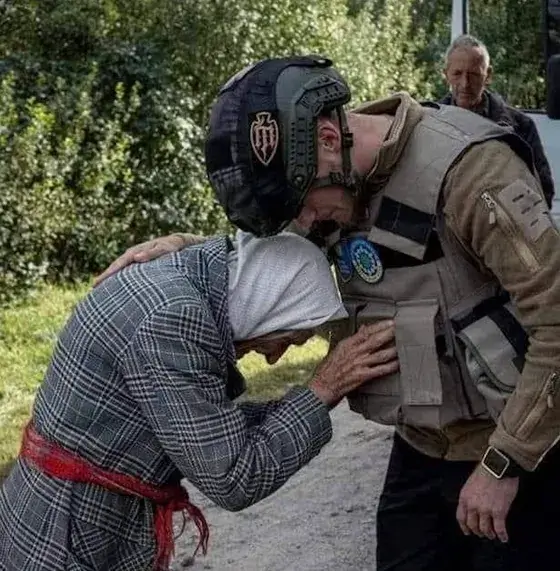
Kherson was very much waiting for the Armed Forces of Ukraine. Photo: Pivden Telegram channel
Not only did russians relocate boarding schools from Kherson, but also took away some children allegedly for rehabilitation. Parents still do not know where their children are, because they have not returned. Therefore, some Kherson residents left with their children to the occupied Crimea or russia, fearing that they would be separated.
Russists visited families with children under 13 and threatened: “If you do not evacuate, the children will be taken away”.
One of the russians’ favourite methods of punishing locals was forced stripping in the middle of the street for inspection, which qualifies as torture according to international standards. The invaders were looking for tattoos during such strip searches.
According to Maryna, a tattoo artist she knew stayed in the occupied city and for several months was inking patriotic and other tattoos that the russians might not like. According to the locals, they mostly stripped those who looked masculine.
The invaders also hunted for community organisers – someone immediately leaked the lists of the most active ones. In addition, when the locals started protesting, they were filmed by drones and then identified in the city.
“Every time you left the house, there was a danger that your documents will be checked, and they might also go through your phone. They checked all messengers, uninstalled applications, they could look at your correspondence, what you deleted, what you wrote, whether there is a Ukrainian flag on your profile pics, and so on”, Maryna says.
Many people who wanted to leave Kherson were sent back from the checkpoint 3-4 times – how many were shot is still unknown. But it was documented that the russists shot cars, and they could first let them through and then shoot them.
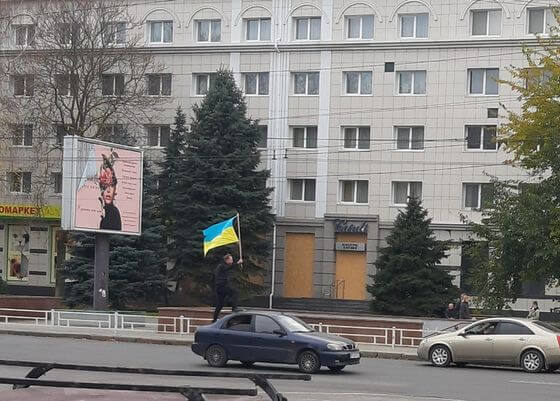
Kherson residents celebrate the return of the Armed Forces. Photo: Pivden Telegram channel
The situation with access to vital medicines was also fatal – we mentioned above that it was next to impossible to get insulin, ART, and hormonal drugs, especially on a regular basis.
“They say that more people died from lack of insulin in Kherson than from bullets”, says Maryna.
Rape: russians hunted female relatives of the military
Locals tell about numerous cases of rape that no one could record.
These facts, according to the activists, are confirmed by doctors: people went to hospitals and clinics, including after severe gang rapes, but doctors were afraid to record them because almost every day the FSB asked who came and what were they diagnosed with. Therefore, rape and even bullet wounds were recorded as colds or ailments.
Relatives of the Ukrainian Armed Forces servicemen – wives, sisters, daughters, mothers – were a very vulnerable group: they were identified and subjected to gang rape more often than others, so they had to be hidden or taken out of Kherson with extreme caution.
“In one case, a woman who survived gang rape was taken out on a rubber boat at night – we found a trusted boatman. We had to make sure everything happened quietly, otherwise, they could be shot”, Maryna recalls.
How did the invaders bully LGBT people in Kherson?
“The Russian military are very homophobic and transphobic because those stereotypes are part of the propaganda that explains to them why they are fighting in Ukraine”, Marina says.
Before the invasion, Russians were told about the terrible LGBT propaganda in Europe and NATO soldiers in Ukraine who turn everyone gay. In Kherson, the now dead quisling Kyrylo Stremousov visited children at school and told them about the terrible gay Nazis.
“During smartphone and paper checks or searches, they looked for Ukrainian symbols or patriotic statements, but they could also find Hornet (an application for gays), a rainbow flag tattoo, or see that the name in the passport does not match the appearance, strip a trans person, find breasts under a binder, and so on. We had a case where they checked two guys’ smartphones, found gay chats, took them to the forest, and one of them was shot in the leg. Both were left in the forest”, Maryna recalls.
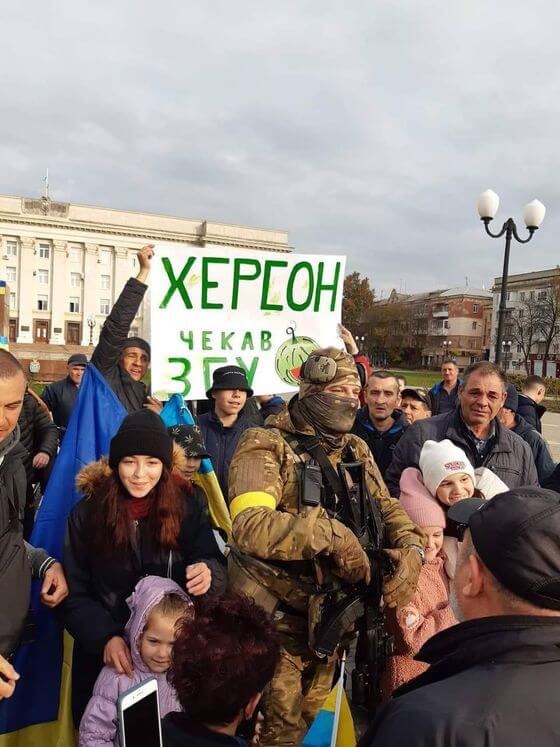
Kherson residents welcome the Armed Forces of Ukraine in their city. Photo: Pivden Telegram channel
According to her, LGBT people in Kherson were afraid of rape. Similarly, transgender people whose bodies did not match the details in their official documents and who could not disguise themselves to look like their passport picture were afraid to leave because they could be stripped at checkpoints.
“Their non-conforming body characteristics could be the reason for anything from rape to torture. There is no data on this – we are unaware of people who would travel with a changed passport and could tell what it was like. Perhaps they are not alive”, Maryna explains.
Because of this, transgender women in Kherson were afraid to leave the house at all. Trans people lived without hormonal drugs all these months.
There are also reports about lesbians who were taken to the forest and abused, and about an LGBT activist who was thrown into the basement, tortured and held captive for two months. According to Maryna, they were extorting information about other LGBT people in Kherson from him – then they were visited at workplaces and intentionally harassed.
Several gay men, whose details were received, were caught and tortured. Some of the survivors were later able to leave the city, some stayed because they were afraid that their data would be stopped at checkpoints and the russists would throw them into the basement.
“There were cases when LGBT people left through Crimea, but the process was the same – they check the phone, do a strip search, look for tattoos, go through your social media, restore applications if you deleted something. I know about people who were really prepared, bought burn phones and left. I know those who deleted everything from their smartphone and managed to get through”, Marina says.
Those who managed to get to Russia, would then, with the help of russian volunteers, go to Georgia and Estonia – if they were allowed to leave the country by the Russists.
How the occupation proved the importance of human rights
“Every person represents some minority or discriminated group.
Therefore, when we say that it is not time to protect the rights of certain groups, we are dismissing human rights as such, because to effectively help people in a full-scale war, to effectively save people, we need to understand the difference in their needs, their risks, their special risks. The more dangerous the situation, the more relevant human rights are.
It was the occupation that showed what life without human rights is and how important they are.”
This article was originally published here
Nothing beats good old email
For our monthly newsletter, we pick the most important news and analysis,
and add selected content and art from queer creators.
